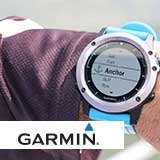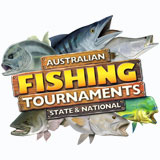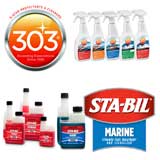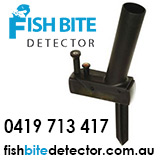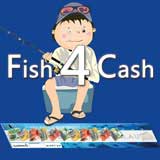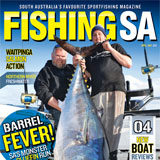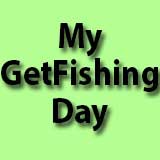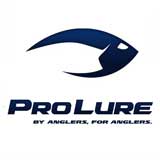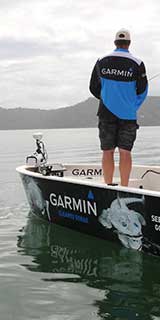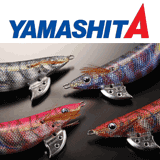Species ID
View AllKing George Whiting
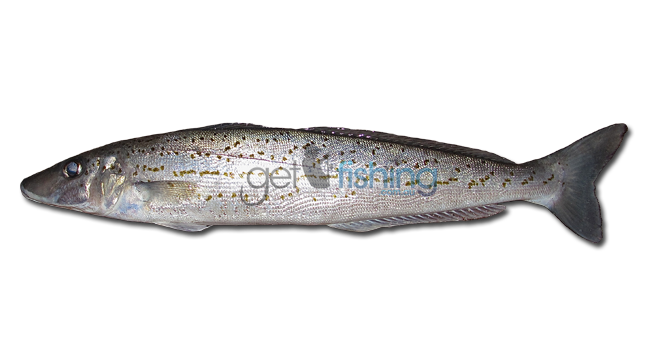
Other Names
KGW, Black Whiting, South Australian Whiting, Spotted Whiting, Australian Whiting, Black Whiting, Elbow Slappers
Where to fish
King George whiting live in coastal marine habitats and estuaries, over sand, weed and low-lying reefs. In South Australia KGW prefer sandy environments during summer and reef environments during winter. When targeting these bottom feeders search for areas that would provide a likely food source such as: Sand patches amongst the weed, sand patches amongst low-lying reef, broken rubbly bottom and sandy channels.
How to target
While King George whiting can be taken on sandworm pattern soft plastic lures, it is widely accepted that bait fishing is far more productive, although less challenging. When fishing from a boat, anchor up and, depending on the rubbish fish situation, use a bit of berley to bring them in. Use a paternoster rig with droppers as close to the bottom as possible. KGW will whack at the bait but often they sit and suck on it so keep the bait moving, feeling for weight by gently lifting the rod tip and bouncing the bait back to the boat. If there is little action after 5-10 minutes then move.
Rod & Reel
There’s no need to get too technical with your King George whiting fishing. However, their often-subtle biting nature does call for an approach with a touch of finesse, so a lightweight, sensitive outfit will be most suitable. A 7’-8’6”, 2-5kg graphite rod with a sensitive tip will aid in bite detection and work well whether you’re fishing from shore or in a boat. Match it with a small 1000-2500 sized reel and you’re in business.
Line and leader
- Bait fishing: 6-15lb braid mainline. Substrate type will determine the strength of leader. Use anything up to 25lb when fishing in rock/kelpy terrain
- Lure fishing: 4-10lb braid mainline and 1.5m of 4-10lb fluorocarbon leader
Terminal Tackle
- Paternoster rig with 2 droppers close to the sinker
- Hook: long shank, stainless, thick gauge
- Sinker: Swivel bomb style or similar
- Optional: Red plastic tubing and/or beads
Best Lures
Sandworm style soft plastics
Best Bait
Beach worms, pippies or cockles, prawns and fresh tenderised southern calamari.
Filleting
See our ‘Fillet King George whiting’ video for the correct method of filleting King George whiting.
Hints and tips
Anglers fish with light, sensitive outfits to feel their often-subtle bite. A popular rig is a paternoster with two droppers.
- When it comes to berley, know when enough is enough. You need to keep them interested but you don’t want to over-feed them.
- Fish actively. Constantly work your bait, lifting the rod up and down, feeling for bites or the weight of a fish.
- Fish with fresh bait. Changing your baits regularly will also increase your success rate.
- If the spot is not producing move on or try a different technique, perhaps try drifting. Knowing when to move comes down to experience but the sooner you get the hang of it the better.
Rigging for bait fishing
Targeting King George whiting on bait is great fun and can be a bit of an art form when the fish are timid. Whether fishing out of a boat or from a jetty a simple Paternoster rig will do the job nicely. The rig consists of a swivel at the top, two droppers with long shank hooks, and a swivel bomb (or similar) sinker at the bottom. Try to get your droppers down low to the bottom, the same as pictured right. For added effect place a couple of inches of red plastic tubing above each hook.
Alternative bait fishing rig
An alternative approach is to get your baits right on the bottom. This rig is ideal for sandy substrates but will result in more snags on a rocky bottom. The rig, as pictured in the downloadable pdf in the ‘Fast Facts’ column to the right, consists of a running bean sinker on the mainline above the rig, a swivel, one dropper with a long shank hook, and one long shank hook tied with a standard knot to the bottom of the rig. This will keep your baits on the bottom at all times and will also work when drifting. Again, some red tubing can be added if you prefer.
Information courtesy of Jason Stevenson, Port Lincoln SA, DPI Fisheries VIC, and Department of Fisheries WA. Photos courtesy of Jason Stevenson.
King George whiting live in southern coastal marine habitats and estuaries in cooler waters from VIC to WA and occasionally NSW.
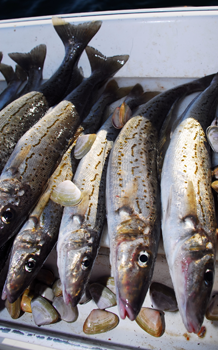
- Are a member of the family Sillaginidae (whitings and sand-smelts)
- Can grow to 72cm in length
- Larger specimens are known as ‘elbow slappers’
- Good eating

